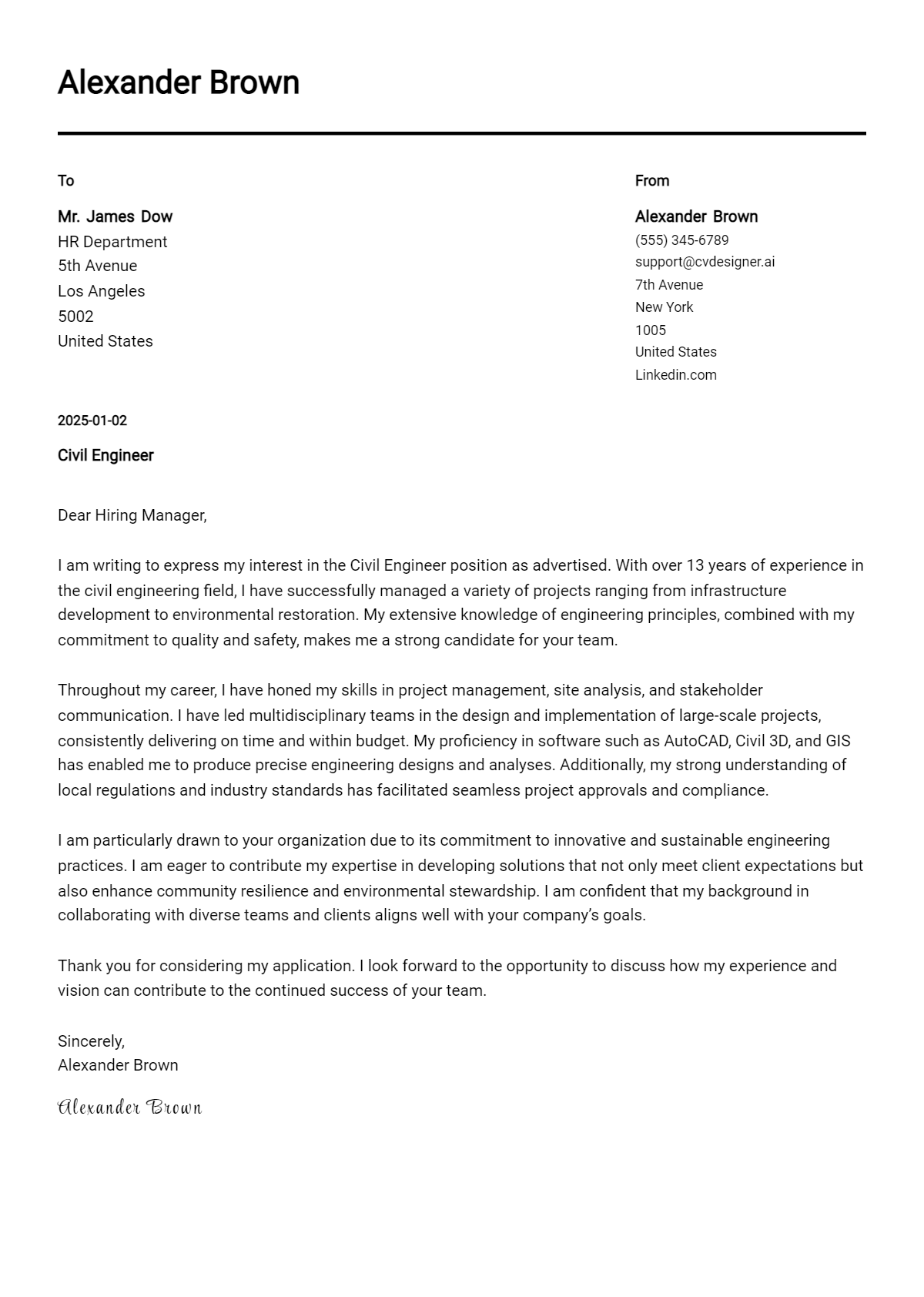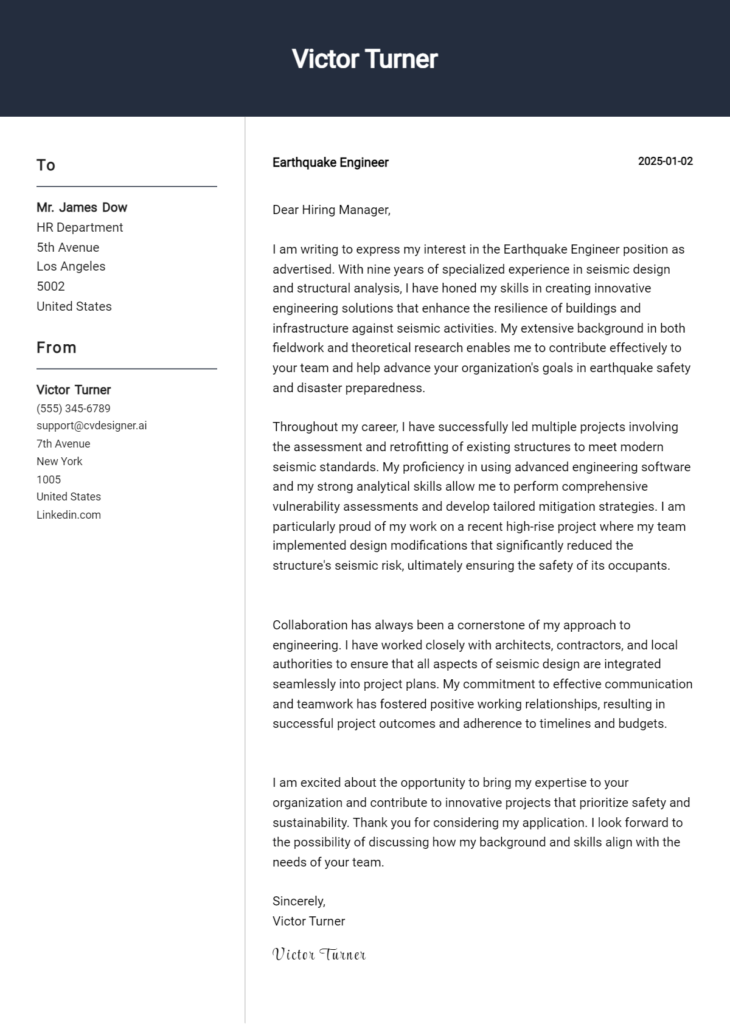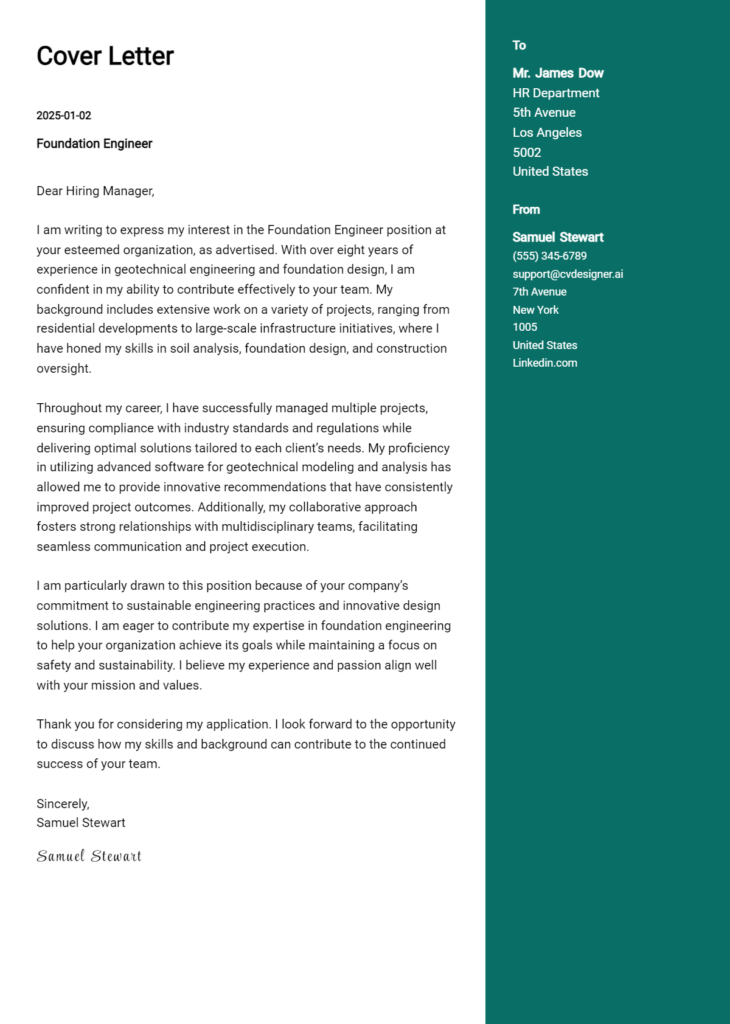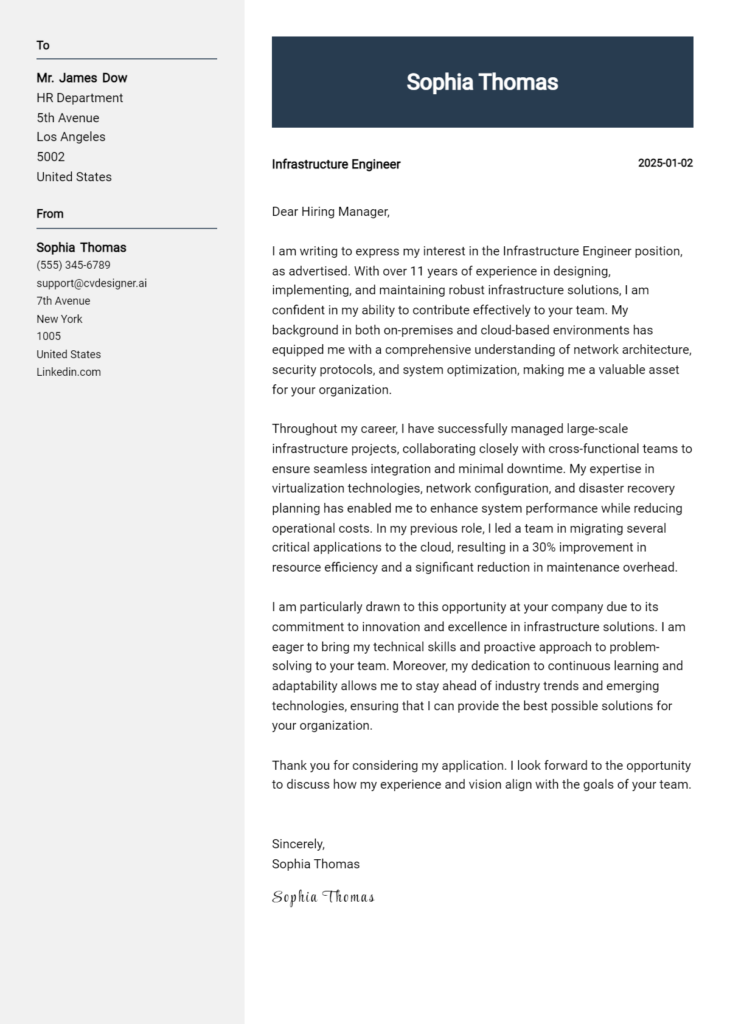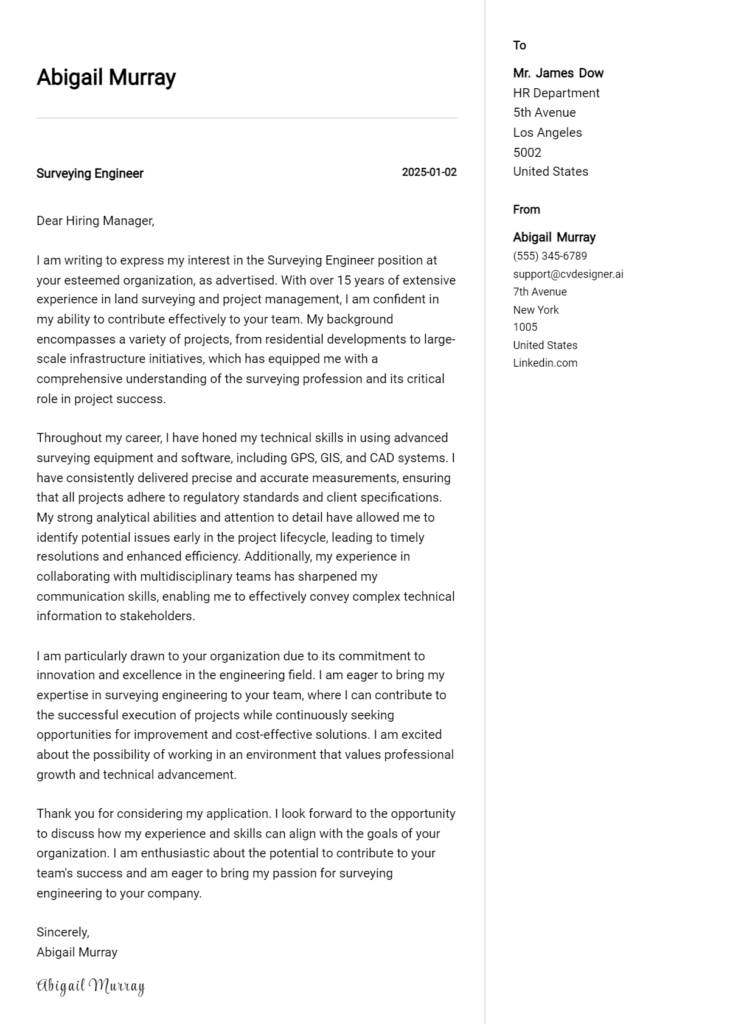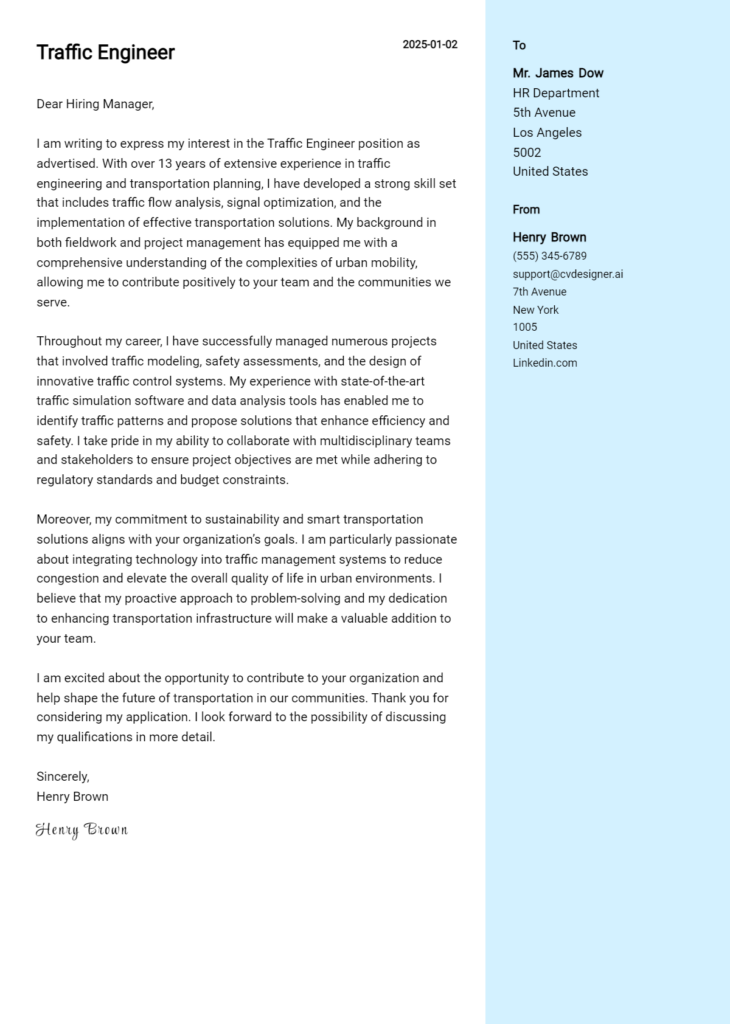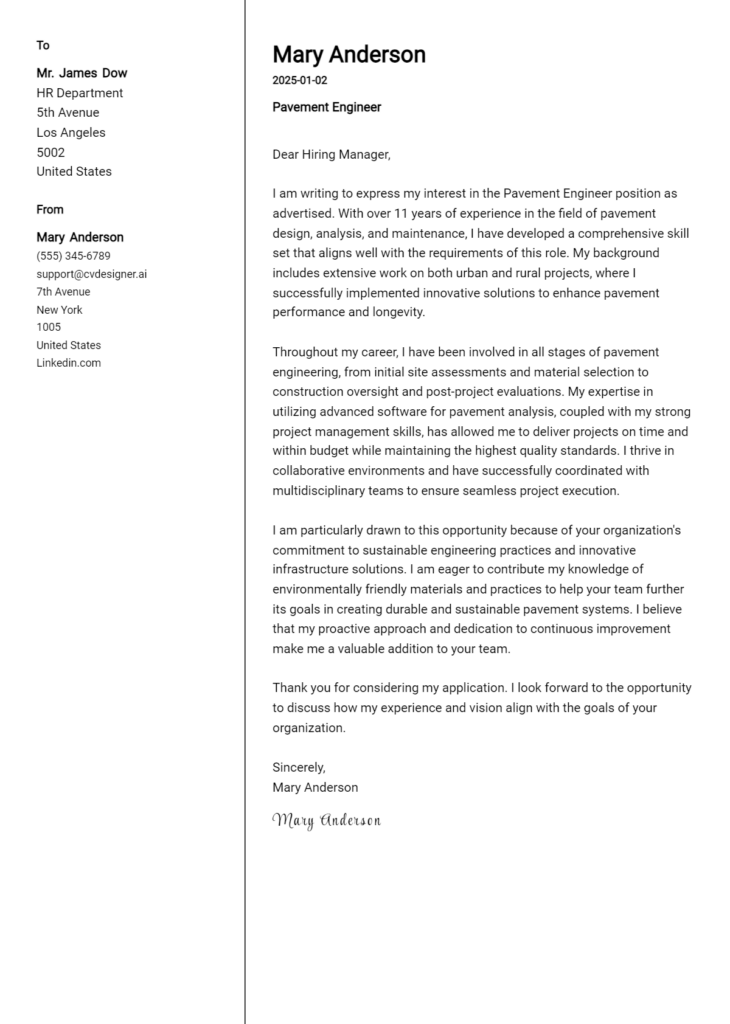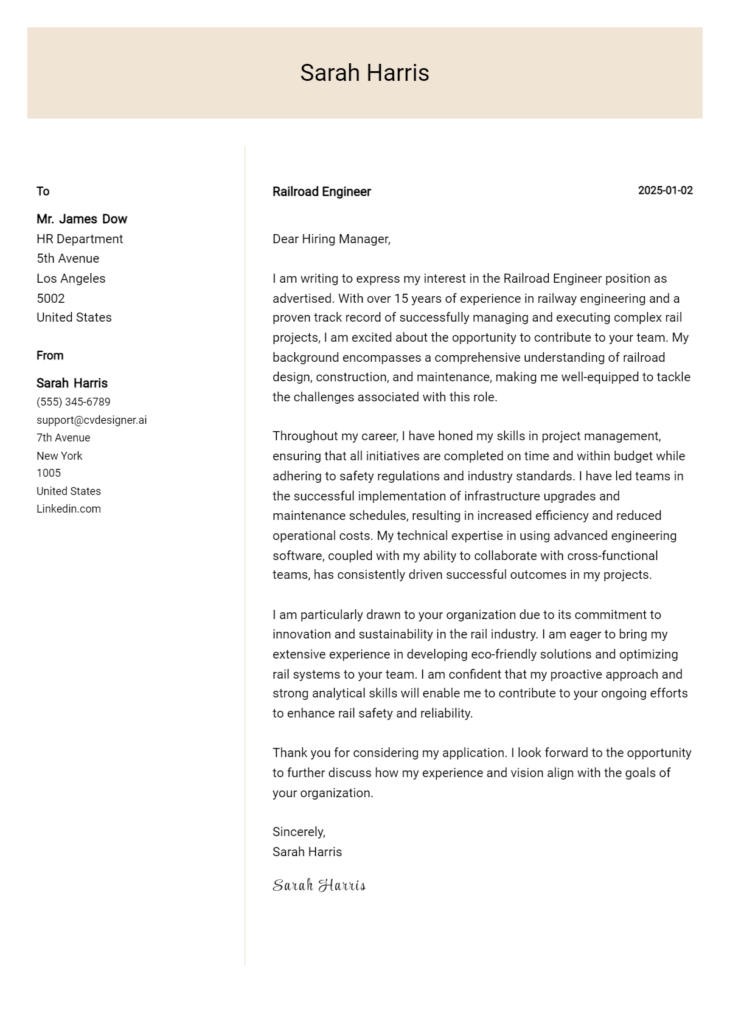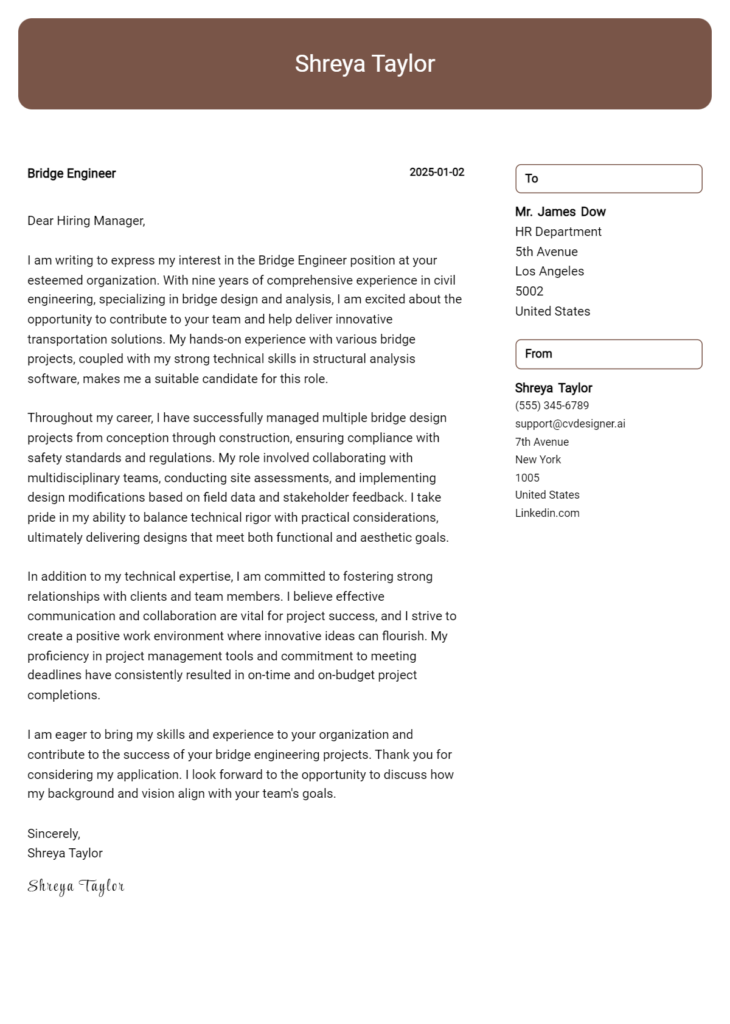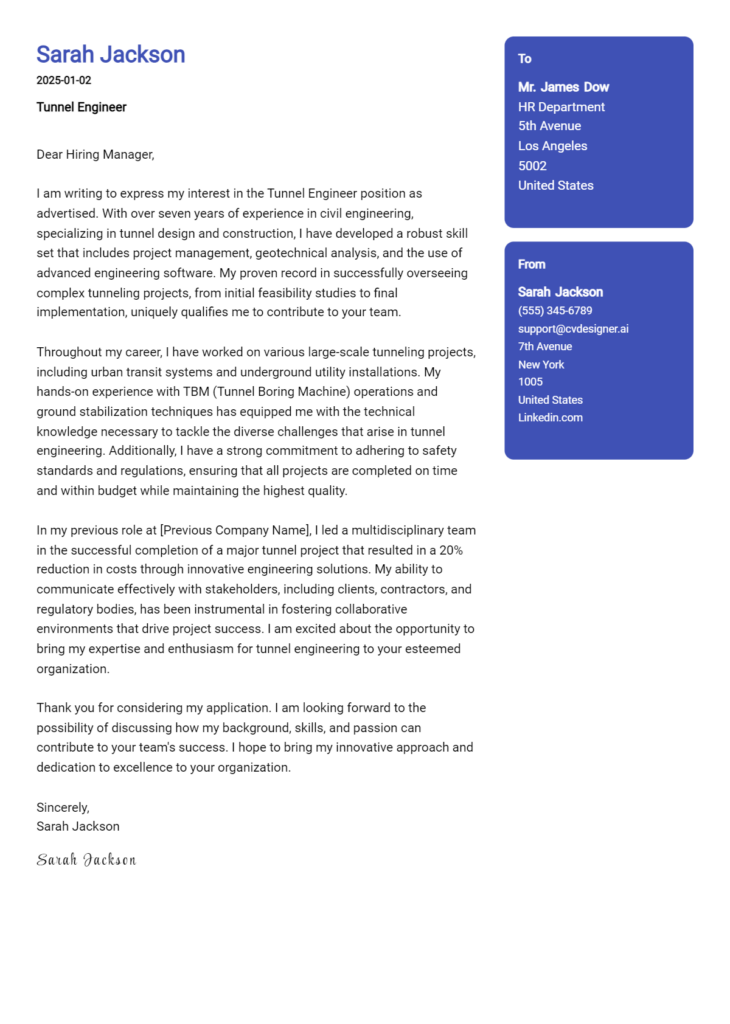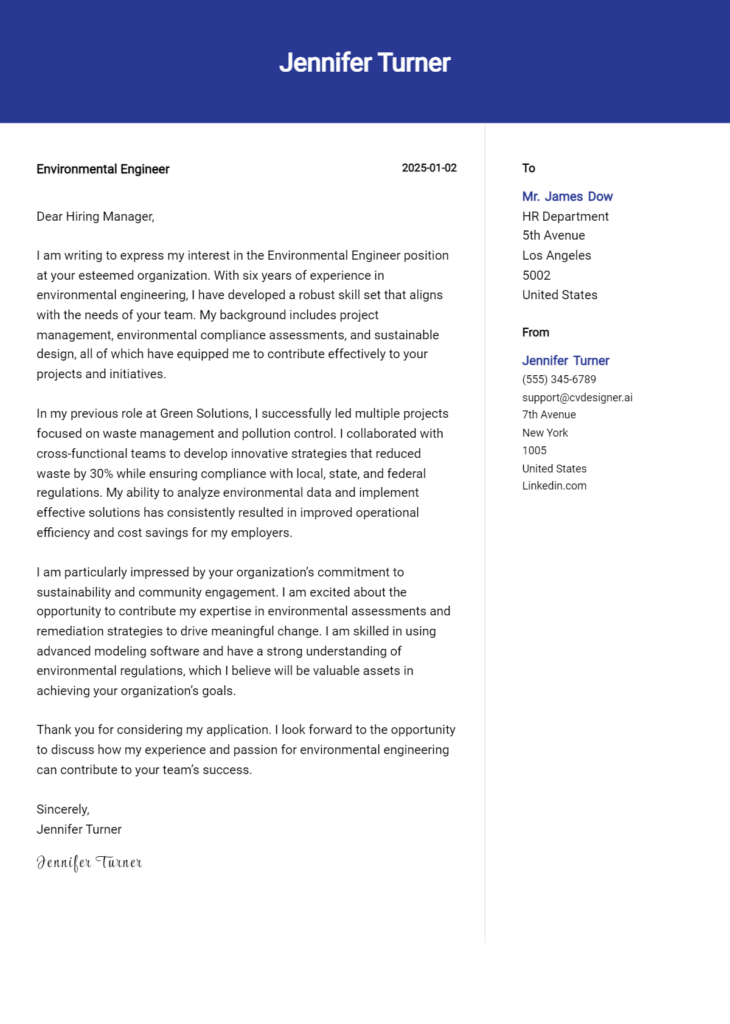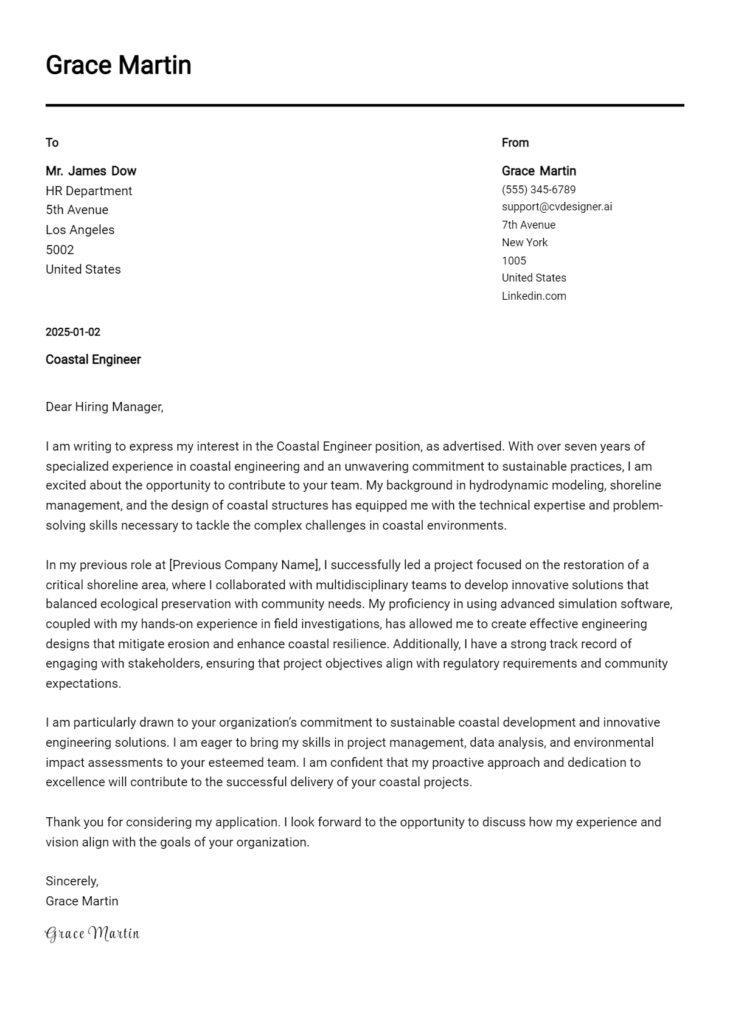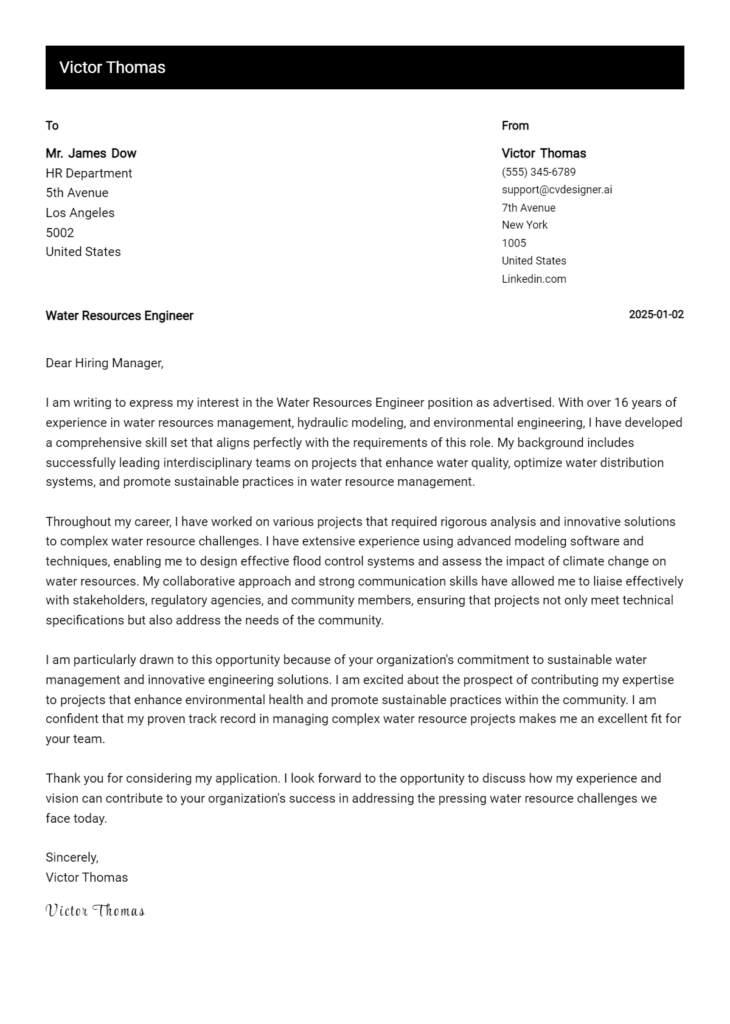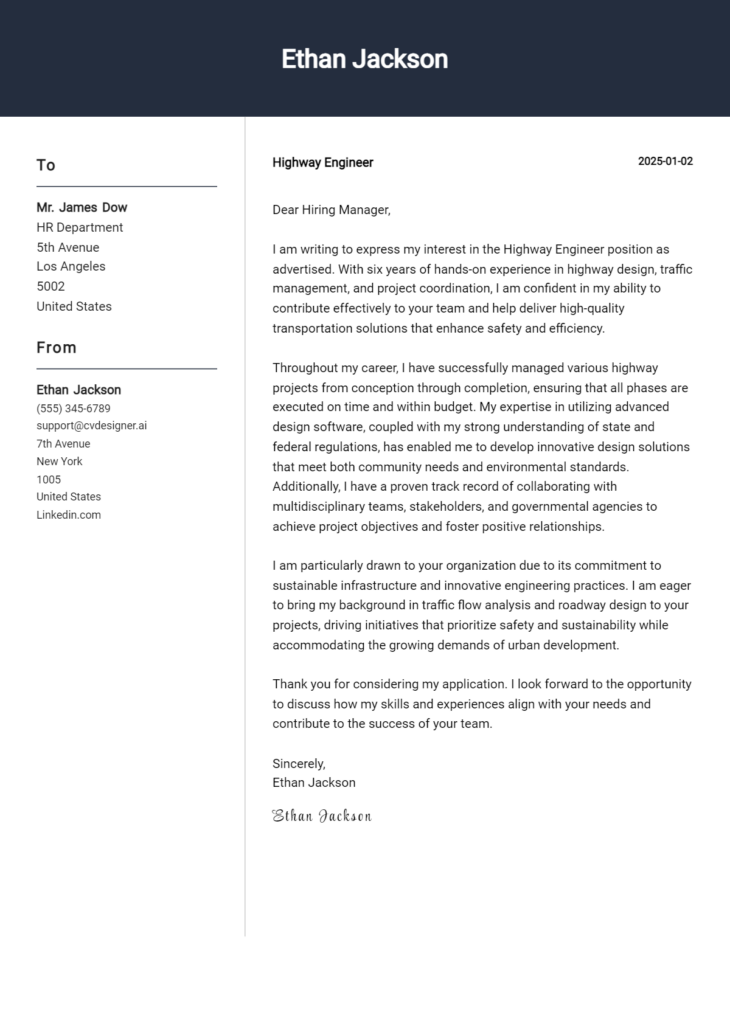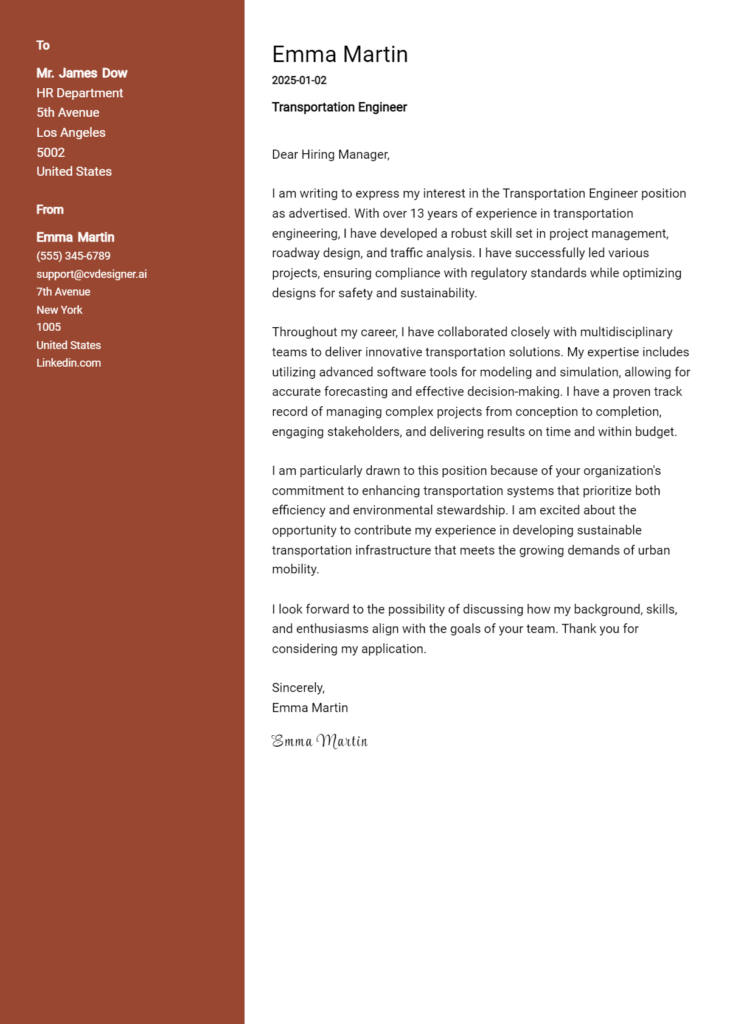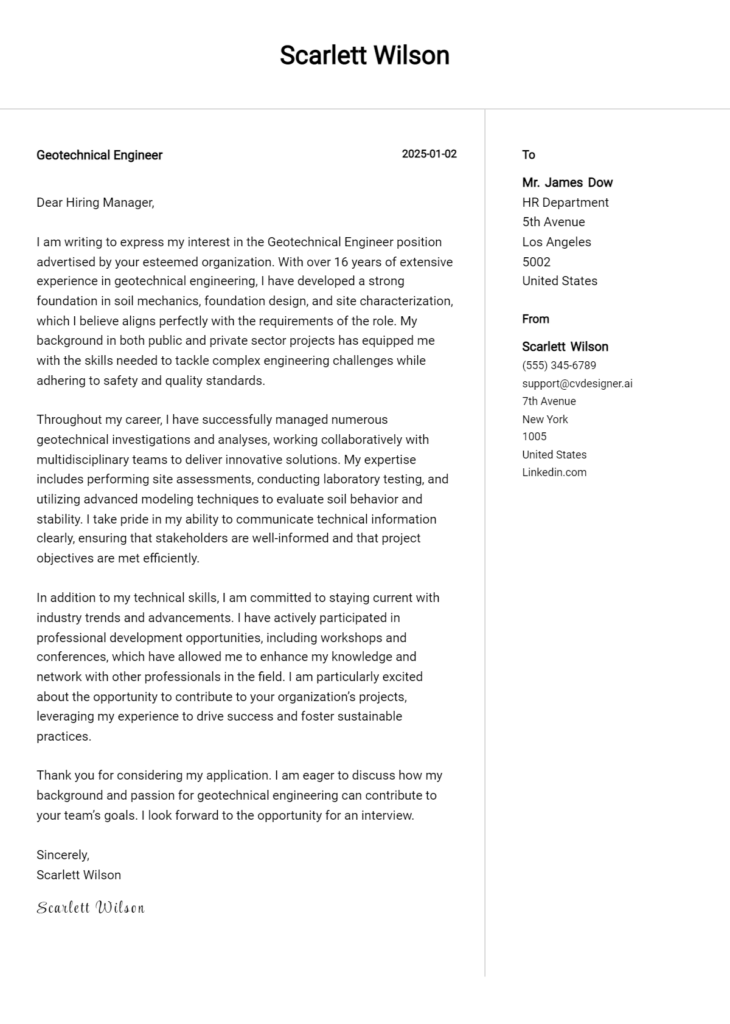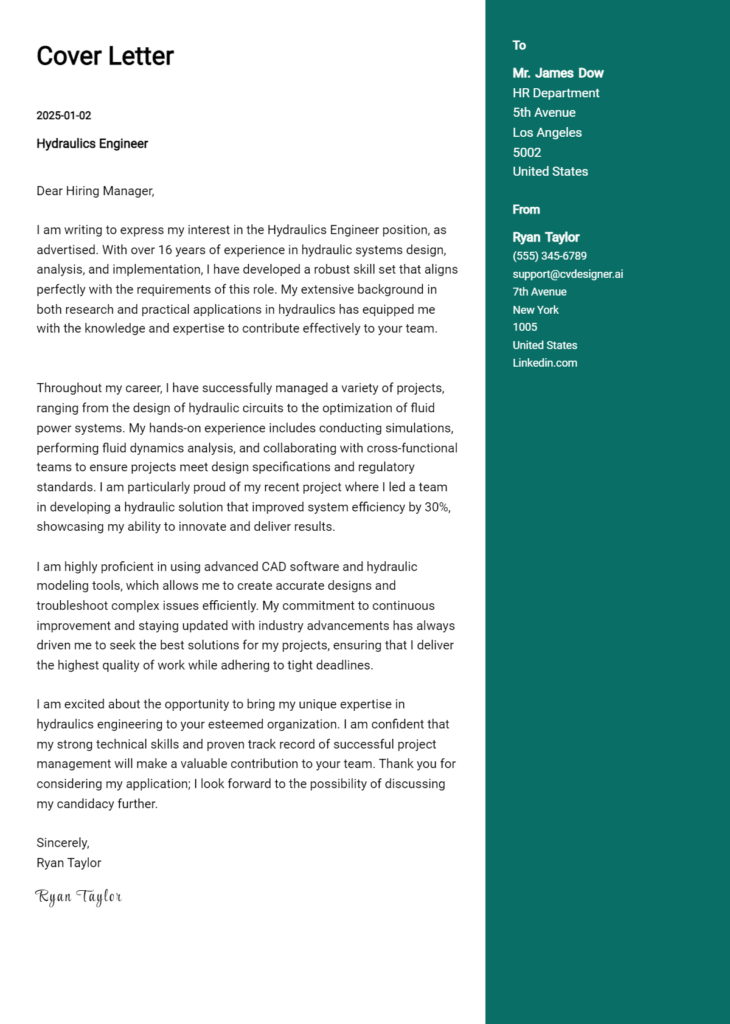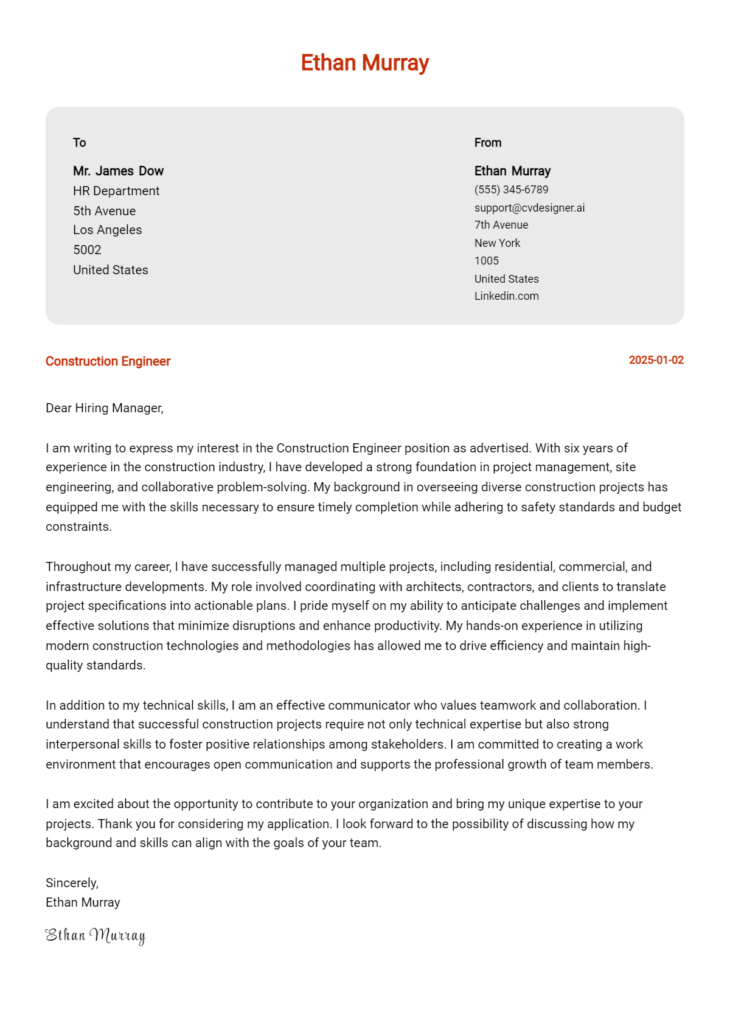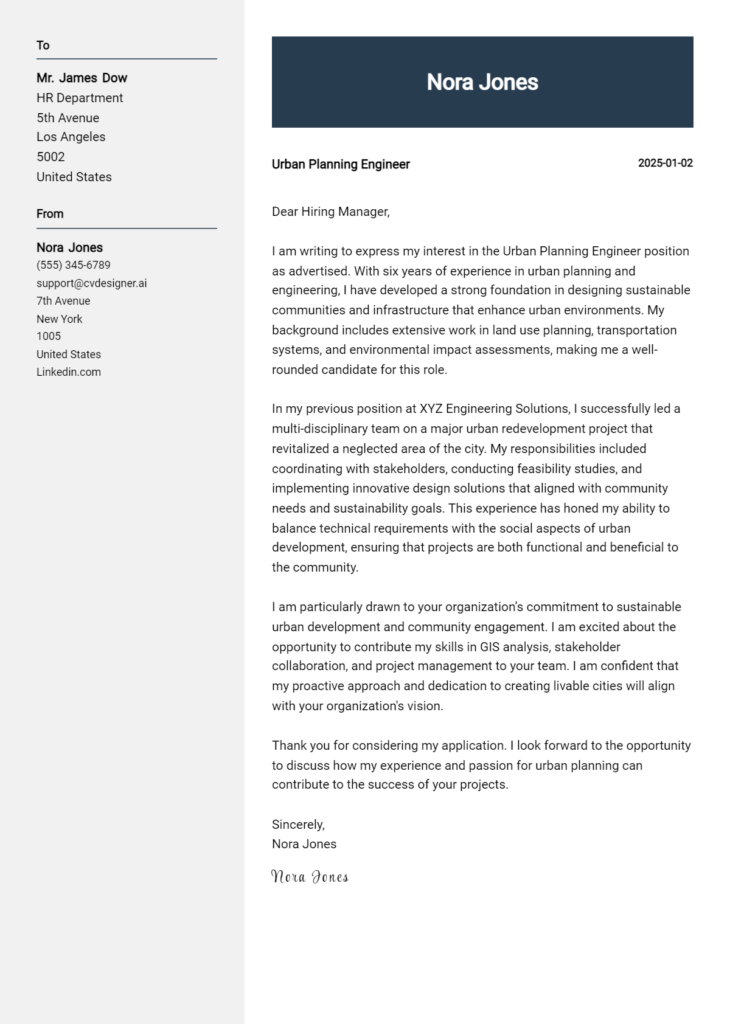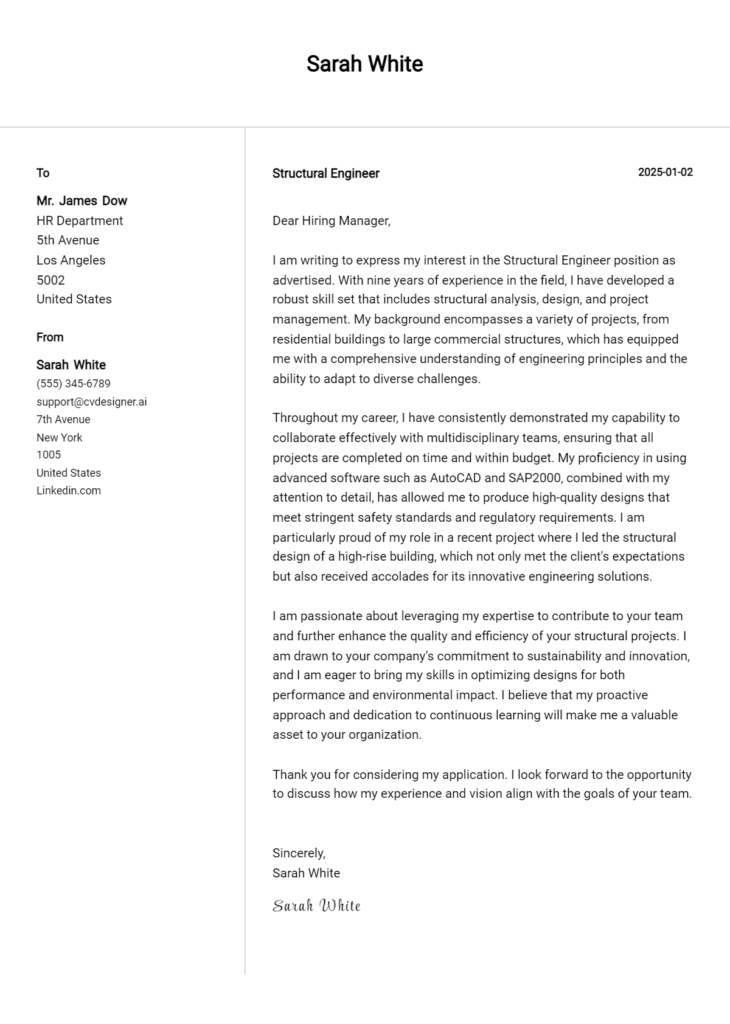Civil Engineer Cover Letter Examples
Explore additional Civil Engineer cover letter samples and guides and see what works for your level of experience or role.
How to Format a Civil Engineer Cover Letter?
Crafting a well-structured cover letter is essential for Civil Engineers, as it not only showcases your technical skills but also reflects your ability to communicate effectively and pay attention to detail. A meticulously formatted cover letter can set you apart from other candidates by demonstrating your professionalism and commitment to the engineering field. Each section of your cover letter serves a unique purpose, helping you convey your qualifications and enthusiasm for the role while making a positive impression on hiring managers.
In this guide, we’ll walk you through the fundamental components of a professional Civil Engineer cover letter, including:
- Cover Letter Header
- Cover Letter Greeting
- Cover Letter Introduction
- Cover Letter Body
- Cover Letter Closing
Understanding how to format each section is crucial for presenting your qualifications clearly and effectively. Let’s delve into the specifics of each part to help you create a standout cover letter for your civil engineering career.
Importance of the Cover Letter Header for a Civil Engineer
The header of a cover letter is crucial as it sets the tone for the entire document and reflects your professionalism and attention to detail. For a Civil Engineer, the header should include essential information such as your contact details, the date of writing, and the recipient's information. A clear and well-structured header ensures that the hiring manager can easily identify you and your intent, which is particularly important in a competitive job market. A strong header not only communicates your qualifications but also showcases your organizational skills, essential traits for a successful engineer.
Strong Example
John Doe 123 Engineering Lane Cityville, ST 12345 (123) 456-7890 john.doe@email.com October 10, 2023 Ms. Jane Smith Hiring Manager XYZ Engineering Firm 456 Construction Ave Townsville, ST 67890
Weak Example
jDoe2000@yahoo.com Hey there, 10/10/2023 Engineering Company
Importance of the Cover Letter Greeting for a Civil Engineer
The greeting of a cover letter serves as the initial point of contact between the applicant and the hiring manager, setting the tone for the entire letter. A well-crafted greeting not only conveys professionalism but also showcases a personalized touch, demonstrating to the employer that the candidate has taken the time to research the company and its personnel. By addressing the hiring manager directly, the applicant establishes a connection that can create a more favorable impression. To avoid generic greetings that may appear impersonal, candidates should make an effort to find out the recipient's name, which can often be discovered through the company's website or LinkedIn profiles.
Strong Greeting Example
Dear Mr. Johnson,
Weak Greeting Example
To Whom It May Concern,
Cover Letter Introduction for Civil Engineer
A well-crafted cover letter introduction is crucial for a Civil Engineer looking to make a lasting impression on a hiring manager. This opening paragraph serves as the first point of contact and should effectively engage the reader, expressing genuine interest in the role while showcasing key skills or relevant achievements. A strong introduction not only highlights the candidate's qualifications but also sets the tone for the rest of the letter, encouraging the hiring manager to continue reading. In contrast, a weak introduction may fail to capture interest or convey the candidate's suitability for the position.
Strong Example
Dear [Hiring Manager's Name], As a dedicated Civil Engineer with over five years of experience in designing and overseeing infrastructure projects, I was excited to discover the opening for a Civil Engineer at [Company Name]. My proven track record of successfully managing projects, such as the recent $2 million bridge renovation that completed ahead of schedule and under budget, aligns well with your team’s commitment to excellence. I am eager to bring my expertise in sustainable design and project management to contribute to [Company Name]'s innovative initiatives.
Weak Example
Dear [Hiring Manager's Name], I am writing to apply for the Civil Engineer position. I have a degree in Civil Engineering and some experience. I hope to work at [Company Name] because it seems like a good place to gain more experience in the field.
Purpose of the Cover Letter Body for a Civil Engineer
The body of a cover letter for a Civil Engineer serves as a crucial platform for candidates to effectively communicate their skills, experiences, and the unique value they bring to a prospective employer. This section allows the applicant to highlight specific projects or accomplishments that demonstrate their technical expertise and problem-solving abilities. By detailing relevant experiences, such as successfully managing a large-scale infrastructure project or implementing innovative design solutions that saved time and costs, the candidate emphasizes their capability to contribute positively to the company's objectives. A well-crafted cover letter body not only showcases the engineer's qualifications but also reflects their passion for the field and commitment to delivering high-quality work.
Strong Example
As a Civil Engineer with over five years of experience, I have successfully led various projects, including the design and construction of a sustainable transportation system that improved traffic flow by 30% in a major urban area. My role included coordinating multidisciplinary teams, managing budgets, and ensuring compliance with safety regulations. Additionally, I implemented a project management software that streamlined communication and reduced project completion time by 15%. I believe my technical skills, coupled with my dedication to innovative engineering solutions, will make a significant impact at [Company Name].
Weak Example
I am a Civil Engineer and have worked on many projects. I know how to use some engineering software and have done some calculations. I think I would be a good fit for your company because I like engineering and want to be involved in your projects.
Cover Letter Closing for Civil Engineer
The closing of a cover letter is crucial for a Civil Engineer as it serves to reinforce your qualifications, express your enthusiasm for the position, and encourage the employer to take the next steps, such as reviewing your resume or scheduling an interview. A strong closing effectively summarizes your key skills and experiences while reiterating your interest in the role, leaving a lasting impression on the hiring manager. Conversely, a weak closing might lack clarity or urgency, failing to prompt the desired action from the employer.
Strong Example
Thank you for considering my application for the Civil Engineer position at [Company Name]. With my extensive experience in project management, structural analysis, and sustainable design, I am confident in my ability to contribute positively to your team. I am very excited about the opportunity to work with [Company Name] and help deliver innovative solutions for your upcoming projects. I look forward to the possibility of discussing my application in further detail and hope to schedule an interview soon. Thank you again for your time and consideration.
Weak Example
I think I would be okay for the Civil Engineer job. I have some experience and skills that might be useful. If you want to talk, you can look at my resume. I hope to hear from you.
These tips will help candidates craft an effective cover letter for a Civil Engineer position. A well-crafted cover letter is crucial for making a strong first impression and demonstrating your suitability for the role. It's essential to showcase your technical skills, problem-solving abilities, understanding of the Software Development Life Cycle (SDLC), teamwork experience, and a passion for continuous learning. By following these tips, you can create a compelling narrative that highlights your qualifications and enthusiasm for the field.
Tips for Writing an Effective Civil Engineer Cover Letter
Highlight Your Technical Skills
Begin your cover letter by emphasizing your technical expertise relevant to civil engineering. Mention specific software you are proficient in (such as AutoCAD, Civil 3D, or Revit) and any relevant certifications. Demonstrating your technical skills early on sets a strong foundation for your candidacy.Showcase Problem-Solving Abilities
Civil engineering is all about solving complex problems. Include examples from your previous work or academic projects where you successfully addressed challenges. Use concrete metrics to illustrate your impact, such as how you improved a project’s efficiency or reduced costs.Demonstrate Knowledge of SDLC
If applicable, discuss your understanding of the Software Development Life Cycle (SDLC) as it relates to civil engineering projects. Highlight any experience you have in project management or software development, and explain how this knowledge can contribute to successful project outcomes.Emphasize Teamwork and Collaboration
Civil engineering projects often require collaboration with various stakeholders. Discuss your experience in working within multidisciplinary teams. Provide an example that reflects your ability to communicate effectively and contribute to a positive team dynamic.Express a Passion for Continuous Learning
The civil engineering field is constantly evolving, so it’s important to convey your commitment to continuous professional development. Mention any relevant courses, workshops, or certifications you are pursuing or plan to pursue. This showcases your dedication to staying updated with industry trends and best practices.
For further assistance in creating a standout cover letter, consider using cover letter templates or a cover letter builder to help organize your thoughts and present your qualifications effectively.
Common Mistakes to Avoid in a Civil Engineer Cover Letter
Crafting a compelling cover letter is essential for standing out in the competitive field of civil engineering. Avoiding common mistakes can significantly enhance your chances of securing an interview. Here are several pitfalls to watch out for:
Generic Content: Failing to personalize your cover letter can make it blend in with the rest. Always tailor your message to the specific job and company.
Neglecting the Format: A poorly formatted cover letter can detract from your professionalism. Make sure to follow proper cover letter format guidelines to present your information clearly.
Lack of Specificity: Being vague about your achievements or skills can leave a weak impression. Use concrete examples from your experience that highlight your qualifications.
Overly Technical Language: While you want to showcase your expertise, avoid jargon that might confuse HR personnel. Use clear and concise language that communicates your capabilities effectively.
Ignoring the Job Description: Failing to align your skills with the requirements listed in the job description can lead to missed opportunities. Carefully analyze the job posting and reflect those key qualifications in your letter.
Typos and Grammatical Errors: Simple mistakes can undermine your attention to detail, a crucial trait for engineers. Always proofread your cover letter or use tools to catch any errors before submission.
Not Including a Call to Action: Concluding without a call to action can leave your letter feeling incomplete. End with a statement expressing your eagerness to discuss your application further.
By steering clear of these common mistakes, you can create a strong cover letter that effectively showcases your qualifications and determination. For inspiration, check out some cover letter examples that can guide you in crafting your unique message.
Cover Letter FAQs for Civil Engineer
What should I include in my cover letter as a Civil Engineer?
In your cover letter, you should start with a professional greeting and a strong opening statement that captures the hiring manager's attention. Include a brief introduction of yourself, highlighting your educational background and relevant experience in civil engineering. Discuss specific projects you have worked on, emphasizing your role and contributions. Mention any relevant certifications or licenses, such as a Professional Engineer (PE) license. Finally, express your enthusiasm for the position and the company, and conclude with a call to action, inviting the employer to discuss your application further.
How can I tailor my cover letter for a specific Civil Engineering job?
To tailor your cover letter, carefully read the job description and identify key skills and qualifications the employer seeks. Match your experience with these requirements by including specific examples that demonstrate your expertise. For instance, if the job emphasizes project management, discuss a project where you successfully led a team. Use keywords from the job listing to align your language with the company’s needs. Personalizing your letter by mentioning the company’s projects or values also shows that you've done your research and are genuinely interested in the job.
What tone should I use in my cover letter for a Civil Engineering position?
Your cover letter should maintain a professional yet approachable tone. Avoid overly formal language that may come across as stiff. Use clear and concise language, and aim for a balance between professionalism and enthusiasm. Show confidence in your abilities without sounding arrogant. Express your genuine interest in the role and the contributions you can make to the company. Remember to keep the tone positive and proactive, which reflects well on your personality and work ethic, making you a more appealing candidate.
How long should my cover letter be for a Civil Engineering job application?
Your cover letter should ideally be one page long, consisting of three to four paragraphs. Aim for about 250 to 400 words in total. This length allows you to provide a comprehensive overview of your qualifications while remaining concise and focused. Ensure that each paragraph serves a specific purpose: the introduction to grab attention, the main body to detail your experience and skills, and the conclusion to reiterate your enthusiasm and request an interview. Keeping it succinct demonstrates your ability to communicate effectively, which is crucial in civil engineering.
Build your Cover Letter in minutes
Use an AI-powered cover letter builder and have your letter done in 5 minutes. Just select your template and our software will guide you through the process.

